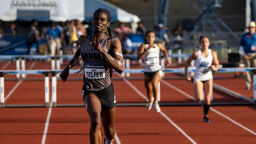Emily Bridges has been cycling competitively for much of her life, first in the male category and then, as she has transitioned, she has hoped to compete in the female category.
She had aimed to qualify for the 2024 Summer Olympic Games and represent Great Britain — she’s from Wales — on the international stage.
Now, as she writes in Vogue, she is leaving the sport that has meant so much to her.
Why? British Cycling has banned most trans women from the female category, and Union Cycliste Internationale — the world governing body for the sport — has done the same.
To be sure, she could — by the rules — compete in the “open” category. Yet after a couple years of hormone replacement therapy, there is simply no way she could be competitive at the elite level against cisgender men. Particularly as she continues on the therapy, depriving her body of processing testosterone, her ability to earn a spot on a men’s Olympic team is truly impossible.
HRT does in fact reduce a trans woman’s athletic capability.
Yet beyond that, Bridges, like so many other trans athletes, feels that being pushed out of the female category — where she feels she belongs — isn’t emotionally sustainable.
It’s something we’ve heard recently from U.S. champion and Olympic hopeful Nikki Hiltz, a trans nonbinary runner who knows that someday their participation in the female category could become emotionally and mentally problematic.
“Right now, competing in the women’s category still feels OK for me and my gender and where I’m at with that journey,” Hiltz said this week. “But the second it doesn’t, I’m not going to sacrifice myself for my sport. I’m going to choose the relationship with myself before my relationship with track and field.”
With the number of youth who increasingly identify as nonbinary or transgender, if you think this topic is going away, or is going to be easily solved with some bans, you’re sorely mistaken.
To be clear, Bridges never actually competed in the female category. The bans were handed down shortly before she was able to start her competitive cycling career as a woman.
Unable emotionally and physically to compete in the male or “open” category, and now banned at the highest levels from the female category, Bridges is walking away from competition all together.
“Cycling competitively was my life for the past 12 years,” she wrote. “But now, I’m divesting from the sport – I have to.”
This is not what anyone should want. Yet increasingly we will see trans women leave sport all together where they are banned from the female category at any level, including at the highest levels swimming, track and field, and rugby.
For her part, Bridges has been an exceedingly thoughtful voice in the conversation about trans inclusion in sports. I have found her to be a voice of reason through so much noise.
While she’ll still be pushing for trans inclusion in her sport, it’s heartbreaking that she has felt the need to walk away from competition.
That it’s this young woman — thoughtful, considerate — who is caught in the middle of this is so unfortunate.
One sport — swimming — is trying to find a path that builds more opportunities to compete, creating an “open” category where trans athletes can compete without transition requirements.
How will it work? Brynn Tannehill, an important voice advocating for trans rights and inclusion, is rightfully dubious given the likely low number of competitors FINA is likely to attract.
Imagine being the only swimmer “competing” in an empty pool? I imagine that could feel quite embarrassing.
The New York Marathon is one that has successfully created a third nonbinary category, where athletes are thriving.
Will a third gendered (or non-gendered) category take hold in sports, with enough interest to create meaningful competition? It will be an area of focus for many in the coming years.
Still, I have long maintained that every trans woman should have a path to participate in the female category. I appreciate different governing bodies are still figuring out what that looks like. One, two, three years of HRT? Gender-reassigment surgery? A change in government ID? The number of different ideas smart, educated people have on how to include trans women in the female category are as diverse as our community.
That’s a good thing, as different sports, and different level of sport, require a variety of considerations.
All-out bans? No.
Effectively chasing people out of sports is the logical conclusion to bans, and I’ve talked to too many trans athletes who share how validated they feel competing against people of their gender.
I’m not afraid of trans women winning. I do think that there should be medical-transition requirements for them to compete in the female category, and at the higher levels those requirements can be high bars.
Give them the opportunity to clear those bars. Build systems that celebrate all the athletes looking to compete and win. Create more opportunities to compete.
I hope we eventually get to see Bridges hop in a bicycle to compete at some point down the road.
























